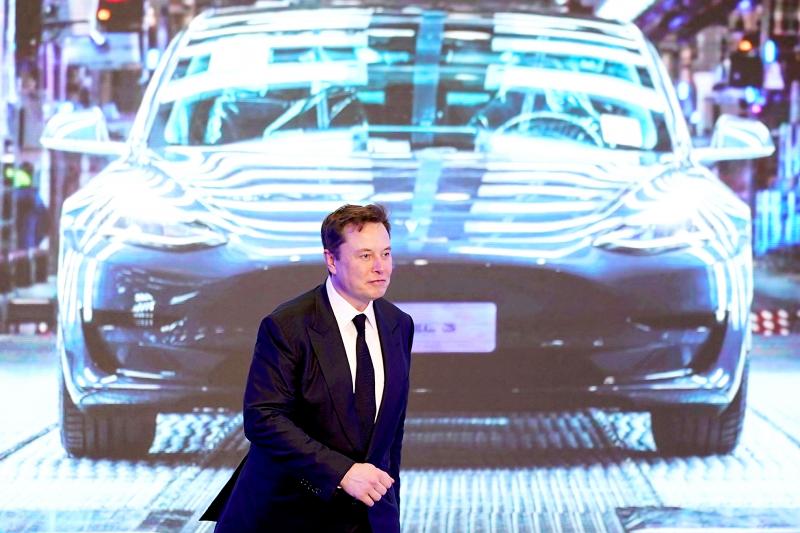Tesla Inc CEO Elon Musk unloaded US$5 billion of stock in the electric automaker shortly after holding a poll on Twitter over whether he should sell 10 percent of his massive stake in the company.
The world’s richest person so far has disposed of more than 4.5 million shares this week, regulatory filings on Wednesday showed. Those were his first sales in more than five years.
Musk, who frequently posts on Twitter and often engages in controversial topics, created a firestorm over the weekend with the survey about whether he should sell part of his Tesla stake — which he connected back to a debate about whether the ultra-wealthy are paying their fair share of taxes.

Photo: Reuters
The poll, which resulted in a decisive vote for him to sell, sent shares of the automaker down 16 percent in two days as investors worried about the consequences of unloading such a large block of stock.
On Monday, Musk offloaded about US$1.1 billion worth of stock to pay income taxes on equity options that he also exercised that day, two of the filings showed. Those transactions were made based on a prearranged trading plan adopted in mid-September.
Earlier this week, he carried out the remaining sales. The filings detailing those disposals did not indicate that they were preplanned.
The documents shed no light on whether Musk’s weekend Twitter poll had any bearing on his decision to carry out some or all of the transactions, or whether he would continue selling until he has met the 10 percent threshold. To get there, he would need to sell roughly 17 million shares, and even more if he includes exercisable options in his total holdings.
The options Musk exercised came from a significant award he received in 2012. He would have had to exercise them before next August before they expired.
Taxes on such transactions are usually covered by immediately disposing of some of the newly acquired shares.
Earlier this year, Musk said publicly that he likely would exercise options earned from the 2012 award in the near future.
It is possible that the option exercises and related sales would have been executed regardless of the Twitter poll’s outcome, given that they were made under a prearranged plan.
However, the terms of such plans are not subject to public disclosure, and executives have wide latitude to cancel or modify them at any time.
Regardless, the headline-grabbing Twitter referendum pummeled Tesla’s shares on Monday and Tuesday, wiping out US$50 billion from Musk’s net worth. Tesla rose 4.3 percent on Wednesday to close at US$1,067.95, paring losses this week to less than 13 percent.
The billionaire last sold shares in 2016, when he exercised options and liquidated some of the newly acquired stock to cover about US$590 million in income taxes.
In his Nov. 6 poll announcement, Musk wrote: “Much is made lately of unrealized gains being a means of tax avoidance, so I propose selling 10 percent of my Tesla stock.”
About 58 percent of 3.5 million votes were cast in favor of a sale.
Musk, 50, is the world’s richest person with an almost US$300 billion fortune, according to the Bloomberg Billionaires Index.

Vincent Wei led fellow Singaporean farmers around an empty Malaysian plot, laying out plans for a greenhouse and rows of leafy vegetables. What he pitched was not just space for crops, but a lifeline for growers struggling to make ends meet in a city-state with high prices and little vacant land. The future agriculture hub is part of a joint special economic zone launched last year by the two neighbors, expected to cost US$123 million and produce 10,000 tonnes of fresh produce annually. It is attracting Singaporean farmers with promises of cheaper land, labor and energy just over the border.

US actor Matthew McConaughey has filed recordings of his image and voice with US patent authorities to protect them from unauthorized usage by artificial intelligence (AI) platforms, a representative said earlier this week. Several video clips and audio recordings were registered by the commercial arm of the Just Keep Livin’ Foundation, a non-profit created by the Oscar-winning actor and his wife, Camila, according to the US Patent and Trademark Office database. Many artists are increasingly concerned about the uncontrolled use of their image via generative AI since the rollout of ChatGPT and other AI-powered tools. Several US states have adopted

A proposed billionaires’ tax in California has ignited a political uproar in Silicon Valley, with tech titans threatening to leave the state while California Governor Gavin Newsom of the Democratic Party maneuvers to defeat a levy that he fears would lead to an exodus of wealth. A technology mecca, California has more billionaires than any other US state — a few hundred, by some estimates. About half its personal income tax revenue, a financial backbone in the nearly US$350 billion budget, comes from the top 1 percent of earners. A large healthcare union is attempting to place a proposal before

KEEPING UP: The acquisition of a cleanroom in Taiwan would enable Micron to increase production in a market where demand continues to outpace supply, a Micron official said Micron Technology Inc has signed a letter of intent to buy a fabrication site in Taiwan from Powerchip Semiconductor Manufacturing Corp (力積電) for US$1.8 billion to expand its production of memory chips. Micron would take control of the P5 site in Miaoli County’s Tongluo Township (銅鑼) and plans to ramp up DRAM production in phases after the transaction closes in the second quarter, the company said in a statement on Saturday. The acquisition includes an existing 12 inch fab cleanroom of 27,871m2 and would further position Micron to address growing global demand for memory solutions, the company said. Micron expects the transaction to